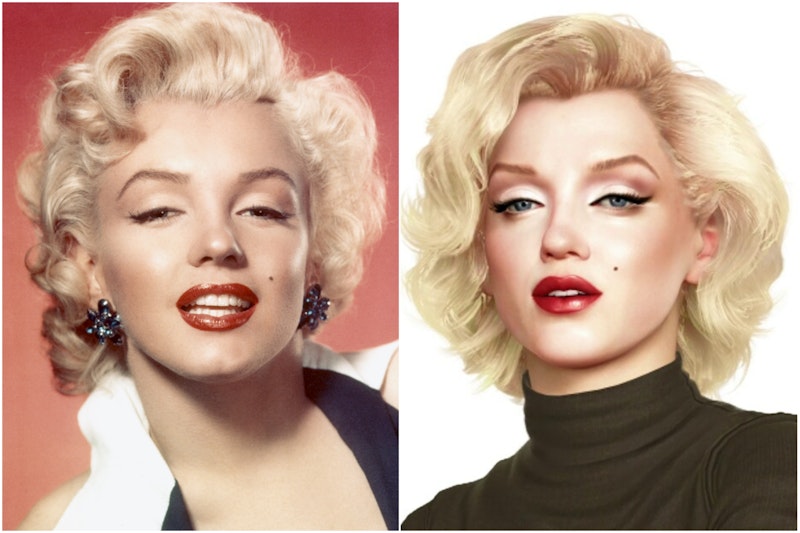“The past is never dead. It’s not even past,” wrote William Faulkner in his novel, Requiem for a Nun. It’s an often-used quote but how does its meaning relate to our experience of technology? Most of what we’ve witnessed in regards to time has been our lack of being in the present moment, erasing history, and obsessed with future, which is almost always dystopian.
As recently reported by The Hollywood Reporter, an AI company, Soul Machines, has partnered with Authentic Brands Group to create a digital Marilyn Monroe. (Authentic Brands Group owns Monroe estate and image since it was sold by Anna Strasberg, wife of acting teacher, Lee Strasberg. (Monroe left most of her estate to Lee in her will.)
Soul Machines is a company that creates “digital persons.” Judging from their website, it sells individual “digital persons” to companies that require customer service. For a monthly fee (and prices vary based on how many features the company signs up for), a company can choose a “digital person” to interact with their customers. Soul Machines’ clients include Google, Microsoft, World Health Organization, and Amazon—all entities we can fully trust!
We’re already talking to a bunch of computers, whether it’s through phone or email customer service. This is why most of the issues never get resolved. What makes Soul Machines different is that a client can add branding to the mixture, and that their “digital person” is autonomous, interactive, and “infinitely customizable.” In addition, “Digital People can be trained on a proprietary LLM, or integrated with GPT, for meaningful interactions that meet business goals.”
In the case of Marilyn Monroe, should you choose to use this “tool,” interactions are “hyper-personalized.” You can input your preferences and Marilyn will dutifully spit out whatever it is you want her to say. But what about that “autonomous,” “authentic,” and “emotive” part? If it’s personalized to your needs, then Digital Marilyn doesn’t have much of a free will.
What makes Digital Marilyn special? According to Soul Machines, “Her impact transcends generations. Her artistic brilliance, unwavering individuality, and enduring cultural influence continue to inspire artists, fashion designers, musicians and writers worldwide. Reimagining her through AI isn’t just about nostalgia; it’s about harnessing the potential of technology to honor and reimagine iconic figures in a way that feels interactive and engaging.”
If you think this answer is a bunch of clichéd gibberish, you’re correct. This sounds like Marketing 101 of a product that shouldn’t be a product to begin with. Soul Machines then goes on to extol the virtues of their particular kind of “Biological AI” (an interesting oxymoron), through which “Digital People™ react with deeply human emotion and empathy, building authentic connections.” What is authenticity in this case? What is emotion? It’s probably irrelevant because if a company like Soul Machines cared for proper metaphysical definitions, they wouldn’t use such words to describe a computer. Even naming the company Soul Machines speaks about the disregard for soul itself.
Soul Machines’ CEO, Greg Cross, claims that the company’s “AI technology is focused on how we can deepen engagement and connectivity between celebrities and fans across the globe. Our technology is never used to replace entertainers, and we partner directly with the world’s leading talent and their estates to ensure it is a true partnership that is approved by, and benefits, the artists we work with.”
Sounds like a nice disclaimer, except the very mission of this company is replacement. Even something as insignificant as customer service implies that actual people will be replaced by the machines. Granted, many of real people who work in customer service sound like idiotic robots but that still doesn’t deny the fact that there’s something strange at work when it comes to companies like Soul Machines.
Marilyn Monroe’s image has been infinitely used, especially after she died. In many ways, the image of Marilyn is completely divorced from the human being that she was. Her life, both beautiful and sad, has proved to be a symbol of any Hollywood tragedy, and that’s the center of this problem—her life has evolved into a symbol.
Companies like Soul Machines offer nothing good or human. No matter how much their own marketing department uses the language that reflects human-ness, it’s still simply selling computers that masquerade as humans. We must push against it.

